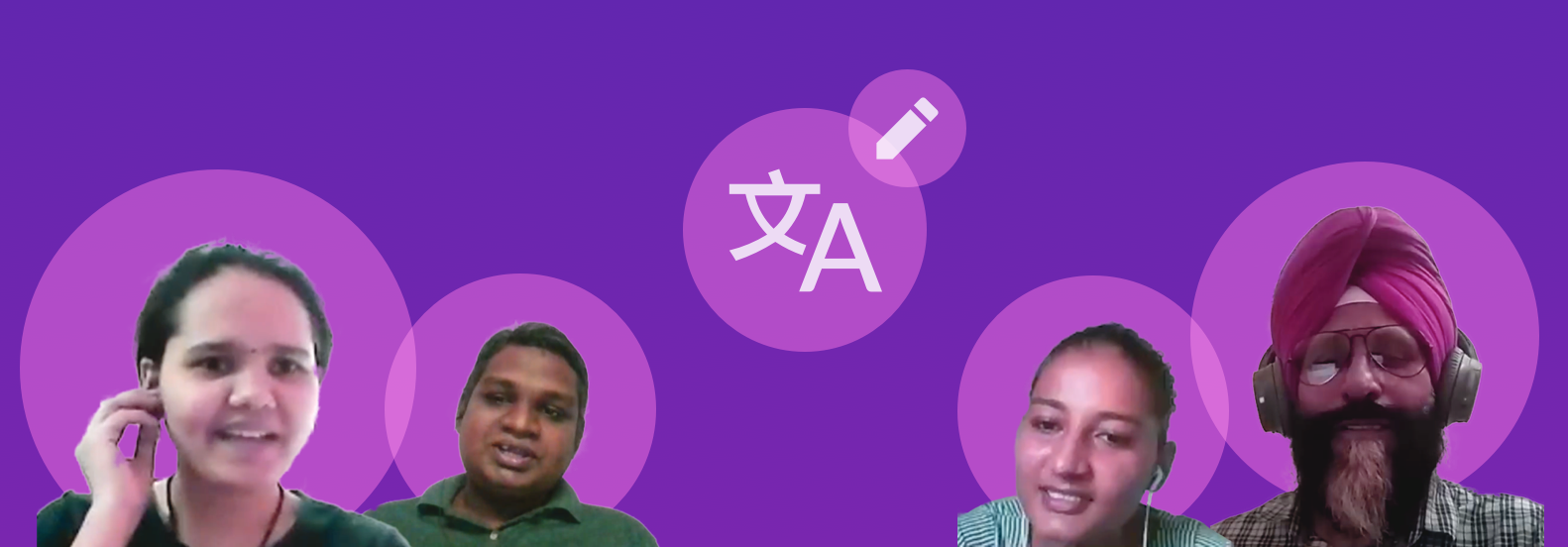Multilingual Editor Experiences in Small Wikis
Supporting multilingual editors in small Wikipedias who are leveraging translation to contribute across knowledge and content gaps.

Overview
The primary goal of this generative research project was to better understand multilingual editor experiences in small wikis, particularly those involving translation. More specifically, we wanted to increase our knowledge of small wiki multilingual editor experiences - both current and potential contributors.
The project investigated experiences of 42 current and potential editors in seven wikis, including Marathi, Kannada, Punjabi, Malayalam, Bengali, Gujarati, and Telugu. Key sub areas of focus included editor values and motivations, barriers to content creation, and awareness/knowledge of the Wikipedia ecosystem, especially translation and multilingual features. The project emphasized task-based inquiry to uncover content creation workflows and provided evaluative assessment of current and potential contributor experiences with current Wikipedia translation tools.
Top High Level Takeaways:
- Most participants, including both current and potential editors, were unable to successfully navigate to Content Translation (CX), despite consistently searching in many of the same places. Many pre-translation workflows begin at large wikis where editors are reading.
- Current editors and newcomers are delighted by a number of CX features that speed up the editing process and require less typing, a challenge for some users. Delighters included automatic links and references, side-by-side presentation of the source/target article, and help generating key article vocabulary.
- Keyboard input challenges with non-Latin scripts are widespread. This is not a CX-specific problem, but impacts the CX experience in critical ways. While some current editors have mastered non-Latin inputs on WP, others have developed a range of workaround solutions. Without the ability to type fluently, users are unable to edit machine translation outputs.
- Observation of editing workflows revealed that 17 of 21 current editors sampled relied on external tools for at least one of the following purposes: input, drafting, translation. These external supports are helping editors accomplish goals such as entering non-Latin scripts, drafting new articles, and translating article sections.
- Alerts/warnings in Content Translation are not always well-understood and timing of their presentation is critical. Editors didn’t always understand how to to resolve alerts, and are not clear on how to proceed if ready to publish but not able to due to a machine translation use limits.
- An editor’s motivation is multi-dimensional. Motivations range from purely altruistic in nature to those grounded in self-improvement. During research sessions, we observed 6 primary patterns: improving access, expanding contents, self-improvement, social, audience, recognition/identity (each detailed in full report).
- Small wikis present unique environments for editors compared to larger wikis. For example, editors noted that when compared to the English wiki, there’s often much less anonymity and more receptiveness to new editors. On the other hand there are fewer editors to complete admin tasks, proofread articles, and help find sources.
- In most cases, participants faced problems related to a specific task. They wanted to troubleshoot a very specific, contextual problem, not access a lengthy help page. New translators may also benefit from the support systems that experienced translators report having; for example, knowing who other active translators on their wiki are, and who to approach for translation support.
- Small wiki editors vary in terms of whether they are primarily mobile-first editors or rely on laptops/chromebooks. In general, editing and reading activities correlate with device use patterns. In general, we found that input of non-Latin scripts is slightly easier for potential editors on mobile devices.
- Despite nearly 100% brand awareness, the editing process remains below the tip of the Wikipedia iceberg. Multilingual readers often default to reading on larger wikis, and translation as a form of editing lacks widespread awareness - even among current editors. Social factors are in part determining how editors contribute and what topics they contribute about.